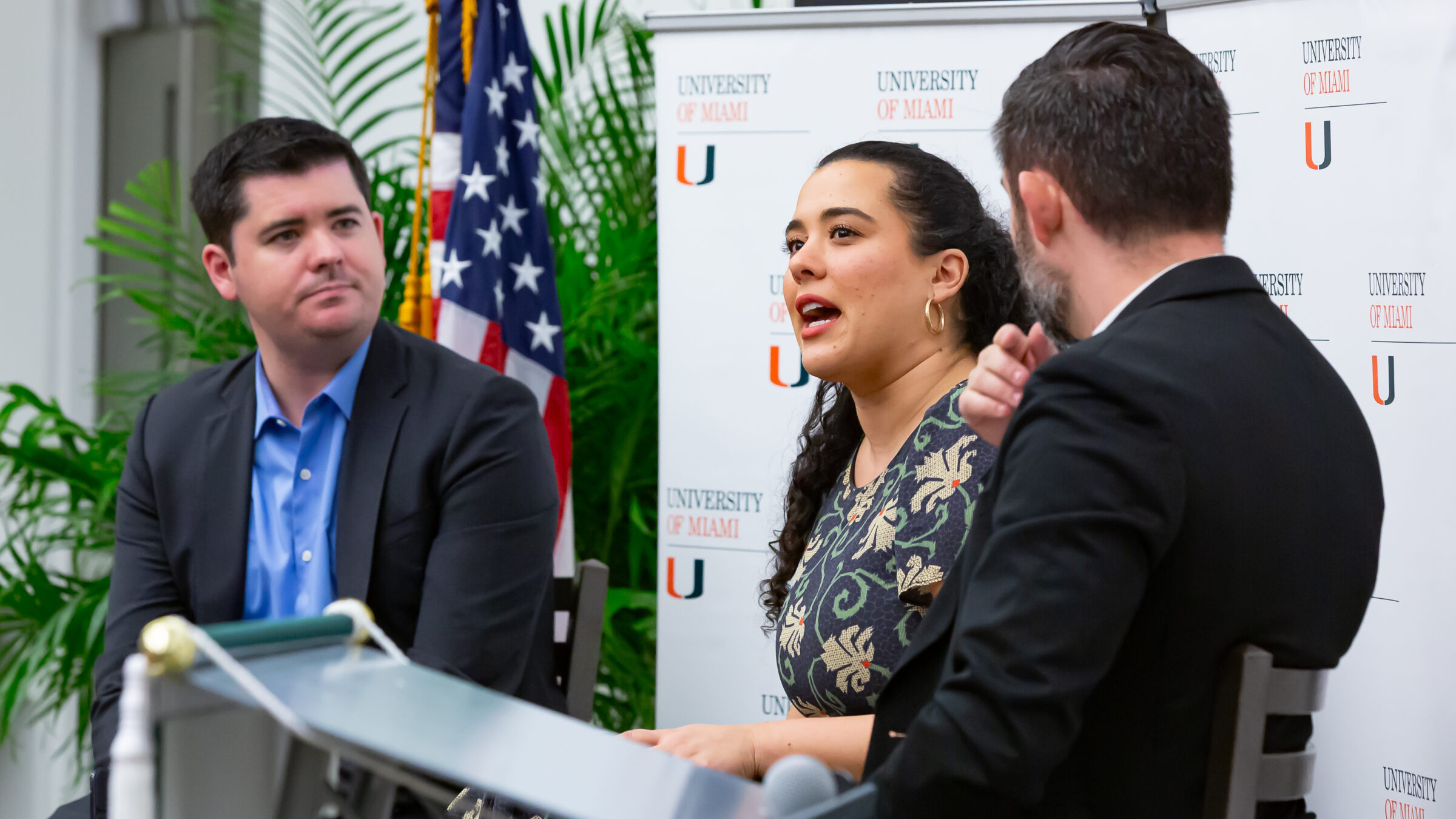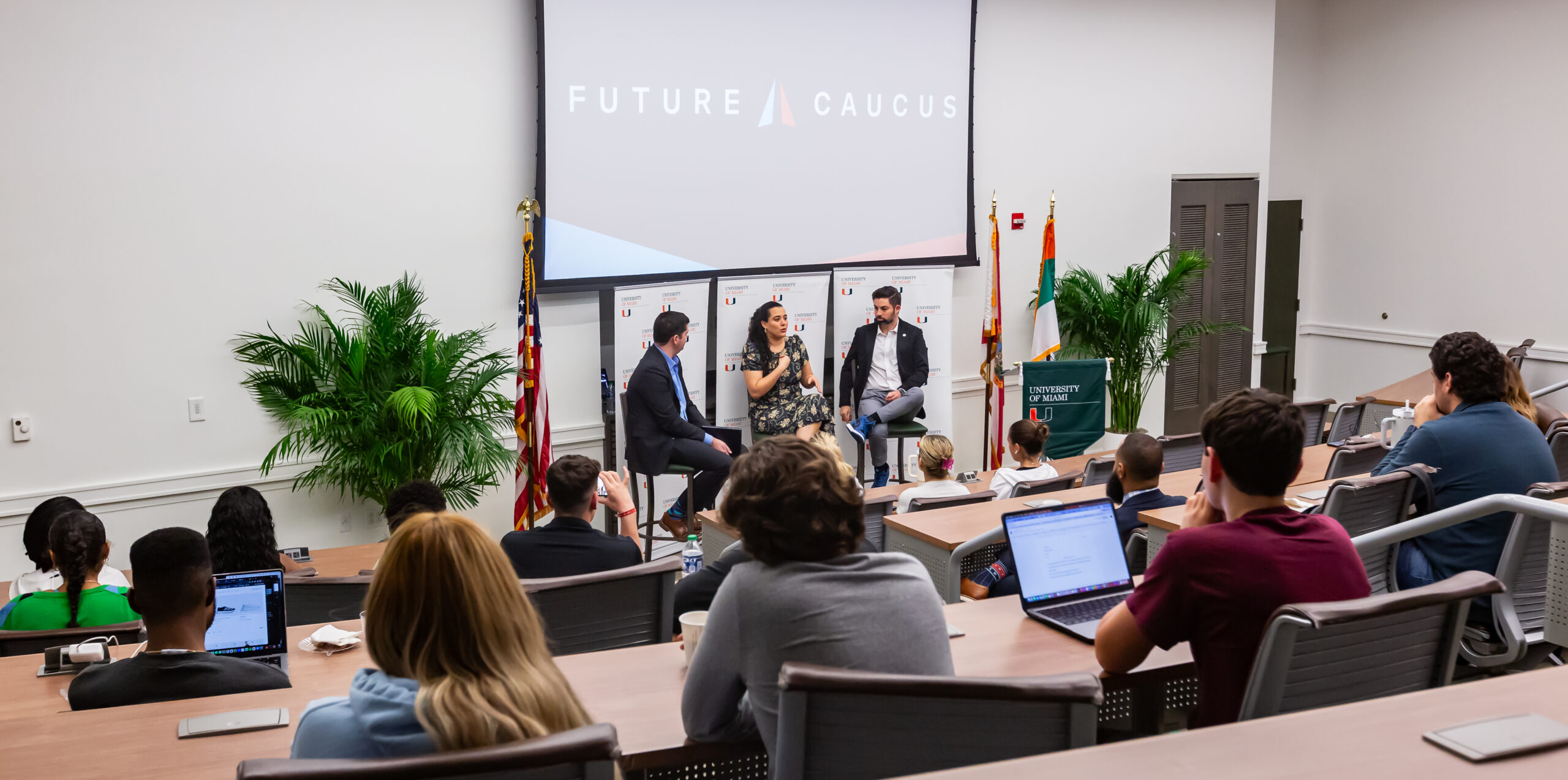Future’s Frontline – University of Miami
Event date: November 30, 2023

By Pamela Goldsmith, Senior Director of Communications, Future Caucus
Nearing the end of 2023, the University of Miami hosted the inaugural event of Future Caucus’ Future’s Frontline Tour — a nationwide initiative spotlighting the collaborative efforts of Gen Z and millennial legislators, inspiring positive examples of public service.
The event featured a panel discussion between Florida Senator Alexis Calatayud (R) and P.J. Campbell, Vice President of Governmental Affairs at the Greater Miami Chamber of Commerce, showcasing their unique journeys in public service. Moderated by Brandon Mitchell, Chief Impact Officer, Future Caucus, the conversation unfolded as a free-flowing dialogue, exploring bipartisan legislation, authenticity in leadership, and the future of young lawmakers while showcasing the achievements of these two leaders representing both sides of the political spectrum.
Calatayud and Campbell reflected on the irony of presenting together on the Future’s Frontline Tour. Their paths unexpectedly crossed multiple times throughout their journeys in public service, from chance encounters in Washington, DC, to working on opposing campaigns in Florida. Despite their different political affiliations, the two have remained steadfast friends. Their intertwined experiences provided a unique backdrop to their insights into government roles, advocacy, and the intricacy of politics.
Both graduates of Florida International University (FIU), Calatayud and Campbell shared personal motivations that led them to pursue a career in politics. After working as a congressional intern in Washington, DC for Congressman Joe Garcia, (D – FL) in 2013, with a focus on political fundraising, Campbell says he “got the hook.” Returning to FIU to continue his education, Campbell took on the role of director of government relations on the Modesto campus, where he would come across his counterpart — Alexis, part of the governmental affairs team. Two years later, Campbell would encounter her again, as a White House intern, turning the corner in the Eisenhower Executive Office Building. “I was like — is she everywhere?,” said Campbell. Separate career paths and secondary — Calatayud was on campus working with a group of student body presidents advocating from around the country.
Later transitioning to political fundraising for a state representative — mayor of South Miami, Javier Fernández— Campbell says he and Calatayud’s paths would cross again, as she was working on the campaign of Fernández’s opponent.
For Calatayud, stepping into the realm of politics was as early on as her freshman year in college. Concerned that the Florida legislature’s sudden change in educational policy would diminish opportunities for populations reliant on scholarships and Pell Grants, she was compelled to head to Tallahassee to learn more from the legislature. Becoming a voice for educational state and federal programs, she brought students from FIU to tell their stories to legislators and explain why investments in grants and scholarships were important.
“I spent all that time [during college] in state and federal advocacy, talking about these issues and trying to make legislators understand the value of these investments in young people, but really in generational change through higher education, access, and affordability,” said Calatayud.

Calatayud sustained that focus, spending the next ten years finding new ways to represent that mission. Working for candidates that believed education could transform lives, she says she spent two years of her life knocking on doors, asking people in her community to support education before becoming director of policy and chief lobbyist at the Florida Department of Education.
After Calatayud’s former boss encouraged her to run for office, she relocated and committed herself to full-time campaigning, raising money and once again knocking on doors, running in a district demographically different from her party affiliation.
“I won the vote by nine percent,” said Calatayud. “I became a Senator trying to find avenues of impact and following the thread, believing in other people’s purpose and leaning into mentors. They [voters] offered me an opportunity to elevate my voice and in doing so elevate the voice of my community.”
Campbell highlighted the importance of relationships in understanding the dynamics of those in power, while Calatayud emphasized the necessary sacrifices made by young legislators to effectuate change.
Focusing on overcoming challenges in a bipartisan manner, the panel discussed key elements of effective leadership, emphasizing the necessary balance between advocacy and collaborative efforts. They shared examples of working across the aisle in passing crucial legislation, shedding light on the details of legislative processes, how they determine legislative priorities and the crucial role constituents play in shaping decisions.
Calatayud elaborated on her role in spearheading affordable housing legislation in Florida, and dispelled the myth that because Republicans held a super majority in the state, all decisions would lean in their favor. Working with the support and endorsement of the state’s Senate President, she was tapped to lead the charge in creating legislation that would reinvent what affordable and workforce housing means in the state. Calatayud says that contrary to expectations, the legislation received unanimous support despite being in a contentious political climate.
Working with the Senate President, Calatayud built a 103-page bill — a toolbox for what would drive developers and housing all across the state to create more units that are workforce affordable — intended for those making less than 80% of the area’s median income workforce. Part of that bill included Live Local, a strategic initiative that incentivized bringing the private market and public sector together to build affordable workforce units, also providing the opportunity for individuals to save enough to eventually buy a home.
“I worked tirelessly, meeting with every single member of the Senate,” said Calatayud. “And every single member of the minority, that super minority in the Florida Senate, spent at least 30 minutes walking through every single piece of policy, and every single funding element that was in that bill to tell them that their opinion mattered, this affected their constituents, and it would be positive for them. And this was one of the most contentious sessions in the history of Florida — complete support, unanimous support.”
Campbell shared experiences in advocating for various policy solutions at a time he did not have a supermajority to work with. He explained that prior to becoming an intern for a Republican member, he had the opportunity to see how the side that was in power operated, how they navigated disagreement and how much of what is accomplished is based on relationships. He contends that a lot of partisan issues have become cultural social issues and emphasized the nonpartisan nature of financial issues in legislative work. “In the year I worked with developers, I don’t think I ever heard the words Republican or Democratic issue,” said Campbell. “It was about being able to operate in both lanes that makes you an effective advocate and makes effective government relations. In Florida, I think whether it’s the fiscal cliff or affordability with housing, the pocketbook and the kitchen table issues are nonpartisan.”

Calatayud and Campbell also shared strategies they find effective in engaging young voters and encouraging their involvement in the political process. Their advice for aspiring leaders in politics or public service emphasized the need for authenticity, a focus on pocketbook issues, and the importance of grassroots efforts. Calatayud spoke passionately about the sacrifices made by young officials to effect change, urging them to stay strategic in their pursuits.
Exploring why younger candidates are drawn to public service and their marked ability to achieve tangible results, the panel looked to Future Caucus’ 2023 Young State Leadership Report, showing that though 25% of state elected officials are Gen Z or millennials, last year 40% of all bipartisan bills enacted by state legislatures were authored by young lawmakers.
Both speakers acknowledged the energy and fresh perspectives younger leaders bring to the political arena. Calatayud explained that much of her generation’s success is due to their focus, as mentioned by Campbell, on pocketbook issues and being grassroots based in their approach to getting things done for constituents. She reflected on how she was received in the Senate as a young lawmaker — with open-mindedness, mentoring and eagerness to support her and her ideas, and what was important to her community.
“There’s something really beautiful about the collegial nature of elected chambers that is lost in translation from the media, lost in translation from what we understand of our politicians,” said Calatayud. “Because so much of what we hear is people yelling at each other or lobbying.”
She explained that for young elected officials, her belief is that their purpose is not just to continue aspiring to higher office. “Our purpose is, I think, authenticity, and our people have genuine needs,” said Calatayud. “So, we’re not effectuating that change if we’re just throwing bombs. I think the majority of us are sacrificing the ability to make money or sacrificing time with our families.” She said she doesn’t miss a single opportunity to be strategic, or to advance the mission of the people that need her to do so.
Campbell shared that people grow tired of seeing leaders not in their age range, making decisions for them. He says the thin line between working on a campaign, and changing the history of Florida’s housing is that it’s only a couple of years. “So, yes, I think that people are seeing that as possible, and seeing it as possible makes it feel more achievable in your mind,” said Campbell.
As discussions concluded, the panel addressed the upcoming 2024 election and the importance of open-mindedness in political discourse, emphasizing the need to challenge pre-assigned roles and think critically about political affiliations. Calatayud underscored the fragility of American democracy, urging students and the community to engage in meaningful discussions to strengthen our democracy.
As Future Caucus continues its nationwide tour, the aim is to inspire the next generation of leaders and ensure a culture of positive public service that ultimately shapes the future of American politics.






Join 1,900+ BIPARTISAN LEADERS NATIONWIDE
Be a part of a network of lawmakers committed to governing effectively, passing more representative public policy, and increasing public trust in democracy.